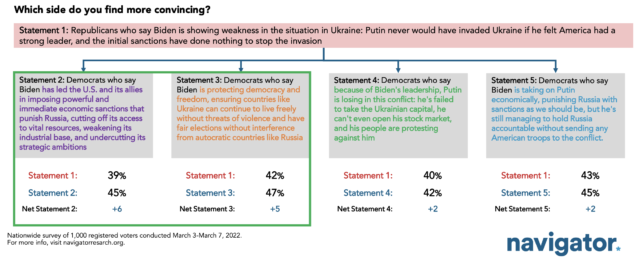- Americans are closely following Russia’s invasion of Ukraine and feel Biden and Congress need to be focused on it – and feel like they are prioritizing it.
- Americans are most worried about human rights violations and deaths in Ukraine, and increased gas prices resulting from sanctions – though worries about gas prices do not deter support for sanctions against Russia.
- As Putin and Russia remain deeply disliked across partisan lines, Donald Trump is seen as more pro-Russia than pro-Ukraine in the current conflict while Biden and Democrats in Congress are seen decisively as pro-Ukraine.
- The strongest messaging on Biden’s response to the Russian invasion of Ukraine focuses on deterrence and Russia’s violation of core principles of peace and security.
Majorities Are Following the Russian Invasion of Ukraine Closely in the News
At least four in five Fox News viewers (85%), MSNBC viewers (89%), and CNN viewers (88%) report following the news closely, while just 74% of social media news consumers say the same.
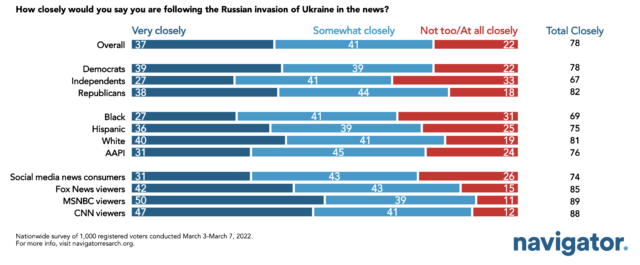 Foreign Policy Is Seen as a Growing Priority for Biden and Congress, and Americans See Them Meeting the Moment
Foreign Policy Is Seen as a Growing Priority for Biden and Congress, and Americans See Them Meeting the Moment
Since early February, there has been a 24-point increase in the share who say that “national security and foreign policy” is one of the most important issues for Biden and Congress to focus on, and 46% say they see it as Biden and Congress’s focus.
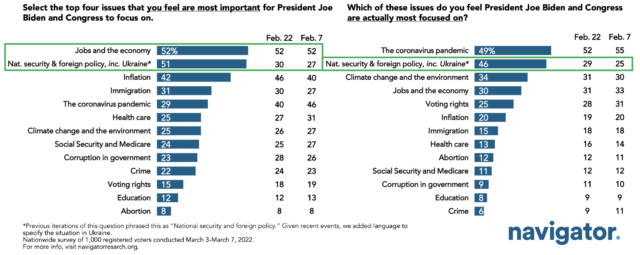
Americans Split Close to Evenly on Which Party is Trusted on National Security and Foreign Policy Issues
Biden and Democrats have a narrow advantage on “maintaining strong alliances with countries around the world” over Republicans (+4) while Republicans have a narrow advantage over Democrats on “protecting national security” (+5).
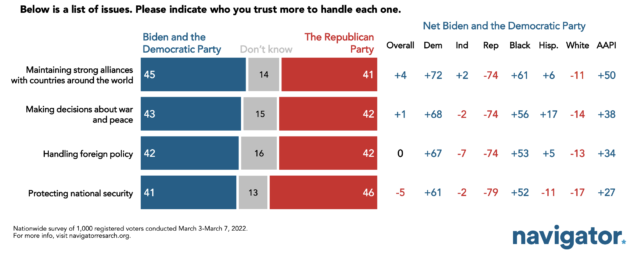
Majorities Say Biden Making the Right Decisions on Ukraine – Including a Third of GOP – But Approval Is More Polarized
When asked to rate the decisions Biden has made on the situation in Ukraine, majorities of Democrats (81%), independents (54%), and nearly two in five Republicans say he has made the right decisions (36%). But, when asked if they approve of the job Biden is doing handling Ukraine, just 71% of Democrats, 30% of independents, and 13% of Republicans say they approve.
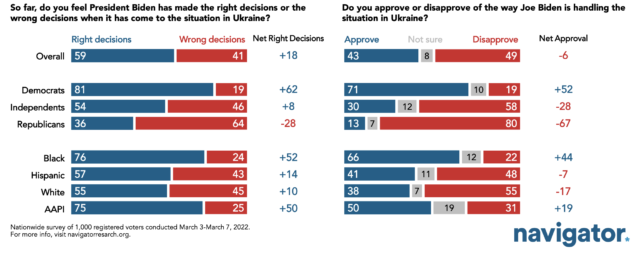
“Foreign Policy Swing,” Who Disapprove But Say Biden Making Right Decisions, Are Male, High-Earning, & Less Ideological GOP
Those who say they disapprove of Biden’s handling of the situation in Ukraine but say he has made the right decisions so far are more likely to be Republicans, especially those who don’t watch Fox News, are men, and earn more than $100,000 annually.
- They tend to give Biden low ratings overall, on the pandemic, and to have voted for Trump in 2020 – but on specific Biden policies, they do support his and Democrats’ new economic plan and trust him to choose the next Supreme Court Justice.
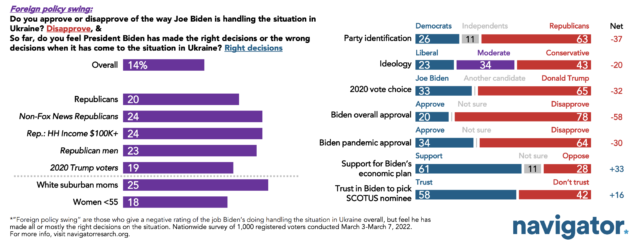
Americans Are Most Worried About the Violation of Human Rights & Loss of Life in Ukraine and Increased Gas Prices
Democrats and foreign policy swing are most worried about the violation of human rights and the death of civilians, while independents and Republicans are most worried about increased gas prices as a result of sanctions on Russia.
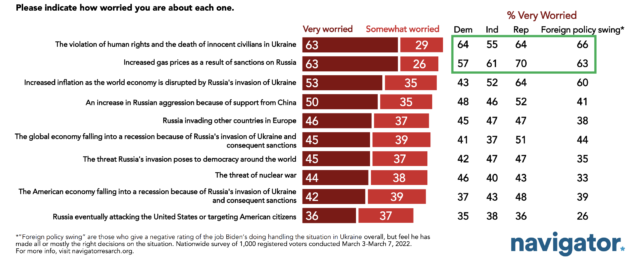
Overwhelming Majorities Support the Economic Sanctions Imposed Against Russia and Sending Military Aid to Ukraine
Bipartisan majorities and foreign policy swing support sending military aid to Ukraine and the sanctions so far against Russia.
- Even among those say they are “very worried” about “increased gas prices as a result of sanctions on Russia” on a separate question, 86% support the sanctions including 60% who strongly support them.
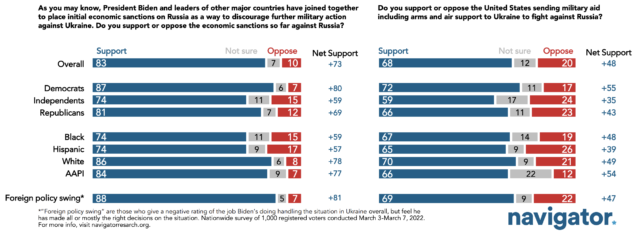
Across Party Lines, Ukraine, Zelensky, and NATO Are Viewed Favorably While Russia and Putin Are Overwhelmingly Disliked
Ukrainian President Zelensky’s favorability increases 20 points (from net +43 to +63) when he is described with his title.
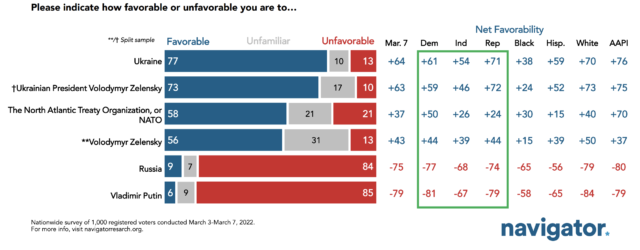
Putin Is Deeply and Increasingly Disliked Across Party Lines
Putin’s favorability has dropped a net 16 points since late January (from net -63 to -79).
- There is no partisan group in which Putin has strength: he is at net -81 among Democrats (down -12 since late January), net -67 among independents (down -13), and net -79 among Republicans (down -21).
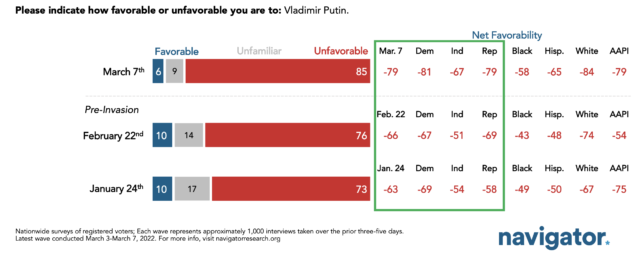
Trump Is Seen as Pro-Russia in the Current Conflict, While Biden & Democrats in Congress Are Pro-Ukraine
Pluralities of Americans overall (-8 net pro-Ukraine), Democrats (-53), independents (-15), and foreign policy swing (breaking even) see Donald Trump as pro-Russia rather than pro-Ukraine in the current conflict.
- • While a majority (64%) say Democrats in Congress are pro-Ukraine (net +53), just 47% say the same of Republicans (47%, net +27).
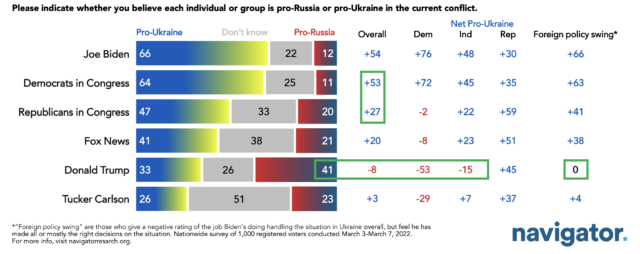
Vast Majorities Agree With Statements About Standing Up to Russia and Disagree With Isolationist Statement
Roughly nine in ten agree with statements about standing up to Russia, whether to protect democracy abroad or to stop Russia’s violent aggression. On a statement that the U.S. should stay out of Ukraine, 56% disagree, including 62% of foreign policy swing.
- Among independents on statements about standing up to Russia, 77% agree with one focused on protecting democracy, while 86% agree with one focused on stopping Russian aggression.
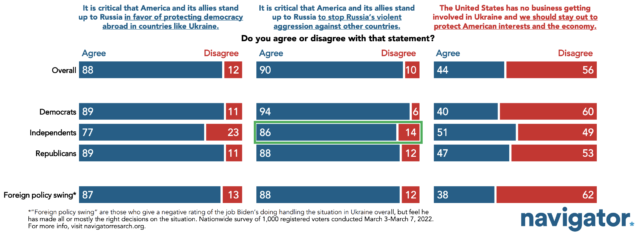
Statements About Deterrence and Russia’s Violation of Global Peace Are Most Convincing to Support Biden’s Response
Among foreign policy swing, messaging that focuses on deterrence to prevent Putin from doing more and Russia’s violation of global peace and security are the most convincing reasons to support Biden’s response to the invasion of Ukraine by Russia.
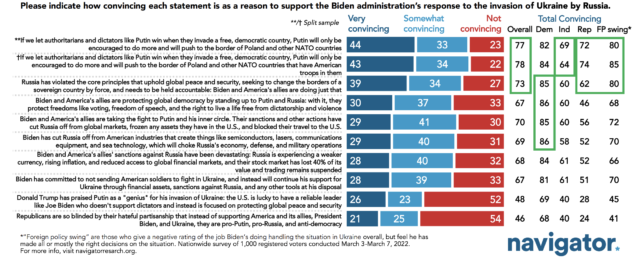
Strongest Rebuttals Against Republican Criticism of Biden’s Handling of Ukraine Focus on Sanctions, Protecting Democracy
When testing a range of Democratic defenses of Biden’s handling of the Russian invasion of Ukraine, lanes that focus on Putin losing and Biden not sending any troops to the conflict are less effective than sanctions and protecting democracy and freedom.
